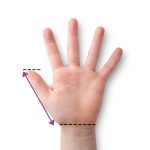Sucking your thumb is a common habit. Talking to your child about it can help them find ways of reducing and preventing thumb sucking.
For many parents discussing thumb sucking with their child can be a tricky task. There are often concerns about the side effects, as well as the psychology behind it. After all, our children’s wellbeing is so important.
Many parents ask us for advice on how to stop children sucking their thumbs. And they also ask about causes and side effects.
So, why do children suck their thumbs, and how should a parent tackle this issue?
When talking to your child, do remember that thumb sucking is
1) perfectly natural and
2) about a need for comfort and security
It is important for parents to know that thumb sucking is perfectly natural – and although there can be negative consequences, these can be avoided through using supportive products like Thumbsies®.
International research shows that thumb sucking can often start in the womb as a means of providing comfort and security. For some children, this habit continues after birth. They find it reassuring and a source of security as they navigate changes in their life or new experiences.
By showing your child that you are not angry about their thumb sucking but want to help them, they will feel positive about their ability to overcome it.
Sucking your thumb is a common reflex. Between the ages of 7 and 11, one in every eight children in the UK are believed to have developed this habit.
- Side effects of thumb sucking
While you should not scare your child about the negatives of thumb sucking, it is important to be aware of potential side effects.
Short term side effects include spreading germs from hands to mouth after playing outside in the grass or mud.
In the longer term, oral health can be permanently impacted. Organisations such as the British Orthodontic Society have said that both jaw and tooth development can be affected by thumb sucking. There is also evidence that speech and language development can be harmed as it can often limit a child’s ability to practise speaking.
There can also be psychological side effects, such as social anxiety and embarrassment, if a child becomes overly-dependent on sucking their thumb as they grow older – an important reason for reducing their dependence on their thumb at a young age.
- How to reduce and prevent thumb sucking
Beating any habit can be difficult. But the good news is help is out there!
While many parents turn to the use of dummies, the NHS states this should be avoided. Only children under 12 months should use a dummy. Encouragement and a rewards system are much better alternatives.
But although encouragement is hugely important, it is not enough on its own. That is where Thumbsie® comes in.
We produce a thumb guard which helps to easily break the habit and ensure that long term dental problems are avoided. Best of all, we have a proven track record of helping children stop sucking for good.
A thumb sucking guard is a fabric thumb protector which fits over a child’s thumb like a glove and helps prevent thumb sucking. The guard is secured around the wrist with Velcro, comes in 5 different sizes, over 40 possible fabrics and has a simple measuring guide. The guard is suitable for boys and girls from 3 years and older and is designed to be totally unrestrictive.
Thumbsies® come in a range of fashionable, child friendly designs. So, whatever your child’s interests are, we’ll have a Thumbsie® for them.
Alongside this, our fantastic rewards chart can serve as the perfect motivation. Quitting the thumb sucking habit can be difficult, but it can also be fun.
Thumbsie® recently celebrated our eighth birthday and won two industry awards in the same month. You can rest assured that we have a well-deserved reputation for excellent customer service – and a product that works!
You can read more oral health advice from the NHS
Please note all comments will need to be approved before appearing on this page. Please respect others when posting.
































Comments